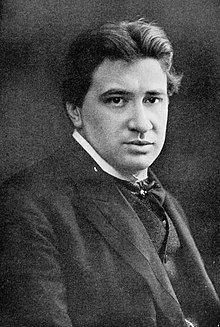Sly (opera)
| Sly | |
|---|---|
| Opera by Ermanno Wolf-Ferrari | |

The composer in 1906
|
|
| Librettist | Giovacchino Forzano |
| Language | Italian |
| Premiere | 29 December 1927 La Scala, Milan |
Sly, ovvero La leggenda del dormiente risvegliato (English: Sly, or The Legend of the Sleeper Awoken) is an opera in three acts by Ermanno Wolf-Ferrari to an Italian libretto by Giovacchino Forzano, based on the Induction (the Prologue) to William Shakespeare's The Taming of the Shrew (the German version of libretto, Sly, oder Die Legende vom wiedererweckten Schläfer, was translated by Walter Dahms). Unlike most of Wolf-Ferrari's other operas, this is a tragedy.
Many musicologists regard Wolf-Ferrari as having written only one verismo opera (I gioielli della Madonna, Berlin, 1911). There are reasons to disagree, and to consider Sly (La Scala, 1927) not only as being, in many ways, a verismo opera, but also as being nearly the last of its kind. And, as such, the virtual end of the noble line of Italian opera, starting, perhaps, with Cimarosa, perhaps with Paisiello, perhaps even much earlier, passing through bel canto, continuing with Verdi and his contemporaries, and eventually ending with verismo. In all these operas the singer was pre-eminent, while in German opera it was the composer and the orchestra.
This is not to say that Sly was pure verismo (for that matter, neither are many other Italian operas of the period)--far from it, it is much more than that, and has many light-hearted elements of musical comedy in it. But that is only what can be expected from Wolf-Ferrari. His early successes had (with the exception of I gioielli della Madonna) all been comedies. Not, of course, in the style of Rossini and Donizetti, but comedies nevertheless. And the influence of these earlier operas was to come shining through in Sly. In fact, the story of Sly can almost be regarded as what started out as an elaborate practical joke (a rather mean joke, true--but still a joke) going sour. Thus, the first act is rather light hearted, and the real verismo elements do not come into play until the tragedy begins to unfold in the later acts.
...
Wikipedia
